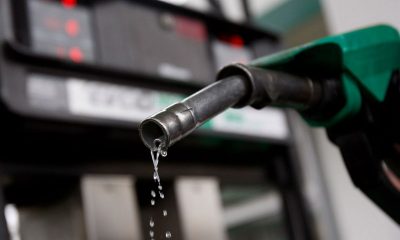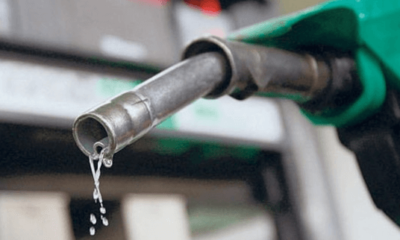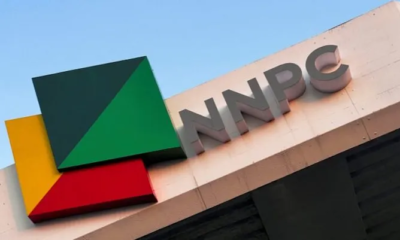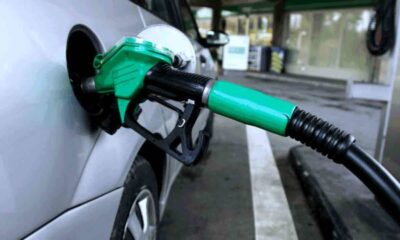Opinion
Time To Prohibit Petroleum Product Imports
By Magnus Onyibe
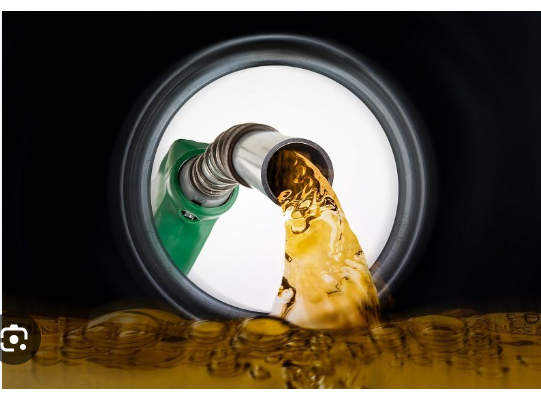
In 2011, the Chinese, demonstrating their strategic foresight, established a refinery in Niger Republic, which borders Nigeria to the northeast. This refinery, with a capacity of 20,000 liters per day and a cost of $5 billion, was completed swiftly and produces both diesel and petrol. Now, the Chinese are in the process of setting up another refinery in Ghana, Nigeria’s southwestern neighbor. Although this new refinery is not yet operational, China and Ghana have expressed their intention to make Ghana a hub for petroleum refining in Africa.
China’s interest in building refineries in countries neighboring Nigeria stems from the region’s unmet demand for refined petroleum products. Historically, Nigeria’s petrol subsidies, which the government has struggled to remove, have encouraged the smuggling of subsidized fuel into neighboring countries. However, with the Dangote Refinery—the largest single-train refinery in the world—now operational, alongside the growing energy independence of nearby nations, smuggling of petrol may become less attractive, casting doubt on China’s plans.
Aliko Dangote’s $20 billion refinery and petrochemical complex in Ibeju-Lekki, Lagos, is central to Nigeria’s current reform efforts to liberate herself from the shackles of economic decline. Though Dangote did not initiate this transformative project under President Bola Tinubu’s administration, it became operational during his tenure. That is even as Tinubu’s government has actively assisted in resolving significant challenges, such as securing local feedstock for the refinery and removing bureaucratic obstacles that had hindered its smooth operation.
The impact of the Dangote Refinery is profound, not only in Nigeria and across Africa—its primary markets—but also in Europe. For example, Nigeria had imported over $3 billion worth of petroleum products from Malta over a span of about 24 months, but the operation of the Dangote Refinery has disrupted this trade. The refinery, which produces Euro 5 standard fuel, has even forced several European refineries that were focused on supplying African markets to shut down. This shift has been acknowledged by both the Organization of Petroleum Exporting Countries (OPEC) and Bloomberg in their separate surveys, underscoring the global ripple effects of the Dangote Refinery.
Given the above, Nigeria has no option but to recognize and promote the Dangote Refinery and others in the pipelines as national assets, particularly in terms of its patronage. This is because its significant impact in Nigeria, Africa, and Europe has repositioned the country globally, not just as a crude oil producer but as a key player in oil refining. It’s a status that Nigeria achieved back in 1965 with the establishment of the Port Harcourt refinery, but a privilege lost nearly 28 years ago when all four state-owned refineries became dysfunctional due to poor management.
Now, what Nigeria has yet to do, but should, is add petroleum product imports to its list of prohibited imports. This should be done in a similar fashion to the Central Bank of Nigeria (CBN)’s restriction on the importation of 41 items that could be produced domestically, preventing access to CBN funds for their import and promoting backward integration and self-sufficiency.
Such a move would not only reduce the pressure on the naira arising from importers of the commodity chasing the dollar to pay for shipments into our country, but it would also help sustain the local refining capacity for crude oil, sparing citizens the ordeal of long fuel queues and even overnight stays at petrol stations to access fuel. Moreover, it would prevent capital flight, create local jobs, and help reduce the high unemployment rate of 5.3% keeping our youths idle and vulnerable to crime. As the saying goes: an idle hand is the devil’s workshop.
Additionally, it would boost the Gross National Product (GNP) and Gross Domestic Product (GDP), which have been declining and contributing to the nation’s financial struggles.
It is pertinent to note that the return of local refining isn’t solely tied to the Dangote Refinery. Nigeria already has five modular refineries in operation, with Aradel starting as early as 2010 and Waltersmith following in 2020. The positive news is that these existing refineries are expanding their petrol refining capacities, something they were previously restricted from doing due to some restrictions embedded in the constitution. For instance, Edo Refinery is working to increase its capacity to 80,000 liters per day.
Additionally, the Crude Oil Refining Association of Nigeria (CORAN) has reported that fifteen more modular refineries are under development. This is alongside the efforts to revive the four legacy refineries, which are in different stages of resuscitation.
Although the Port Harcourt refinery has failed to resume production on seven different occasions after multiple recommencement announcements, once all these refineries eventually come online, Nigeria will be flush with refined petroleum products. Ideally, a significant equity stake in these state-owned refineries would be sold to capable investors who possess the necessary expertise. This would allow the refineries to operate efficiently and profitably, similar to the Nigerian Liquefied Natural Gas (NLNG) company, where major International Oil Companies (IOCs) are the majority stakeholders. One would argue that, that model, as opposed to the Operation and Management (O&M) concept being contemplated by the Nigerian National Petroleum Corporation Limited, NNPCL. Additionally, the funds raised from the sale of equity in these refineries can be invested in other sectors of the economy, particularly in infrastructure, such as solar panels, which are becoming more essential as electricity costs skyrocket.
This information makes it clear that the policy shift isn’t solely aimed at benefiting the Dangote refinery. Instead, it marks a broader transformation in Nigeria’s energy security strategy, allowing the nation and its citizens to genuinely benefit from petroleum energy sufficiency and independence. This paradigm shift is largely driven by the Petroleum Industry Act (PIA), which is gaining renewed momentum in the current administration.
The narrative represents a ray of hope in what seems like a dark tunnel. Despite the socioeconomic challenges making the future seem bleak, as a nation, we are far from doomed. The reset that these reforms are intended to initiate is already showing positive signs, like the imminent energy security resulting from local petroleum refining.
Before diving deeper into what has gone right or wrong in the past year of President Tinubu’s administration, I must acknowledge that I have faced criticism from those who don’t agree with my less pessimistic perspective on the country’s state.
In simpler terms, some critics question why my writing tends to highlight the positive developments rather than the prevailing negative sentiments. My response is that one should always seek opportunities within adversity. I implore more Nigerians to toe that path to maintain their sanity, especially in these difficult times. As a democracy advocate and an optimist, I aim to see beyond challenges and highlight the brighter side of life, rather than only dwelling on the negative aspects that people, especially those affected by hardships, often exaggerate. If everyone fixates on the difficulties, there’s a risk that hope might be lost, which is the danger of focusing solely on a single narrative. That’s why some of us choose to emphasize the glimpses of hope on the horizon.
As a public policy analyst and democracy advocate, I take it upon myself to counter the risks of a single-story paralysis by highlighting the positive developments for Nigerians. However, many pessimists, who only skim the headlines, reject my optimism, preferring to focus on fear, despair, and gloom over the hope I try to bring through my analyses.
Chimamanda Ngozi Adichie, the acclaimed Nigerian author, and women’s rights advocate, recently shed light on the concept of the “single story,” describing it as “a narrative that only offers one perspective, repeated over and over.” She warns that the danger of this single story is that it fosters stereotypes, ultimately discouraging progress by making people complacent.
Equally important for our political leaders is the advice from Gary Vaynerchuk, who said, “Don’t take constructive criticism from people who haven’t constructed.” Vaynerchuk, a well-known entrepreneur, author, and motivational speaker, stresses the need to evaluate the credibility of the source when receiving feedback.
In Nigeria, where football spectators often act as though they know more than the coaches, our political leaders would do well to heed the advice of experts like Taiwo Oyedele, the President’s adviser on tax reforms, and Olu Verheinjen, the adviser on petroleum energy, rather than listen to the detractors engaging in nihilistic politics.
For instance, consider the recent announcement of new tax incentives under Executive Orders 40-42 by President Bola Ahmed Tinubu. These incentives, the product of work led by Oyedele and Verheinjen—both recruited from the private sector—are aimed at pulling Nigeria out of its economic and political challenges. Should we ignore such policies with the potential to uplift our country, just to appear socially acceptable by lamenting the state of the nation rather than celebrating its progress?
These newly unveiled fiscal incentives hailed as groundbreaking, include the Value Added Tax (VAT) Modification Order 2024 and the Notice of Tax Incentives for Deep Offshore Oil and Gas Production, in line with the Oil and Gas Companies (Tax Incentives, Exemption, Remission, etc.) Order 2024. The VAT Modification Order introduces exemptions for key energy products and infrastructure, such as diesel, feed gas, Liquefied Petroleum Gas (LPG), Compressed Natural Gas (CNG), electric vehicles, Liquefied Natural Gas (LNG) infrastructure, and clean cooking equipment.
This is in addition to the tax reliefs already provided to Medium and Small-Scale Enterprises (MSMEs) to boost liquidity and stimulate economic activities. If implemented effectively, these measures will reduce living costs, enhance energy security, and accelerate Nigeria’s shift to cleaner energy. With transportation costs playing a huge role in the average Nigerian’s life and the rising cost of living intensifying hardships, these tax breaks should provide much-needed relief.
Moreover, the Notice of Tax Incentives for Deep Offshore Oil & Gas Production is set to offer tax relief for deep offshore projects. This initiative seeks to position Nigeria’s deep offshore sector as a prime destination for global oil and gas investments. Some analysts even project that this could push Nigeria’s oil production to 4 million barrels per day, more than double the current capacity of 1.6 to 1.7 million barrels per day.
Isn’t this the reason why ExxonMobil recently pledged, during a meeting in the U.S. with President Tinubu’s Special Adviser on Petroleum Energy, Olu Verheinjen, to invest $10 billion in offshore exploration infrastructure? Shouldn’t we be highlighting this positive development to inspire hope, rather than perpetuating the pessimism that keeps many Nigerians in a state of despair?
Based on feedback from the presidency sources, these reforms are part of a broader agenda of investment-led policies championed by President Tinubu, underscoring the administration’s commitment to sustainable growth, energy security, and overall economic prosperity for Nigerians.
Similarly, under the leadership of Dele Alake, formerly a prominent figure in the media, the Ministry of Solid Minerals is working to transform Nigeria’s solid minerals sector into a key contributor to the economy through foreign exchange. In the past, the country’s mineral wealth was exploited haphazardly, but with proper management, these assets are poised to start yielding significant economic benefits, much like Nigeria’s oil and gas resources.
As the two-year mark of the four-year tenure of the incumbent administration approaches—the timeline some Nigerians have set for President Tinubu to start delivering on his Renewed Hope agenda—there are signs of progress. For the many Nigerians who have struggled under the weight of the administration’s radical reforms, there are indications that things may be improving.
Looking ahead, it is expected that by the end of this year, inflation—which is already on a downward trend—will decline further. Likewise, the naira, which remains weak against foreign currencies, should strengthen as the nation’s economic fundamentals improve.
Undoubtedly, Nigerians are eager to breathe a sigh of relief—and rightfully so.
Banning importation of petroleum products which makes up forty percent (40%) of our country’s import bill will be a good starting point towards strenghtening the naira and further accelerate the current downward slope and trajectory of the hitherto galloping inflation rate so that Nigerians can exhale.
Magnus Onyibe, an entrepreneur, public policy analyst, author, democracy advocate, development strategist, alumnus of the Fletcher School of Law and Diplomacy, Tufts University, Massachusetts, USA, and a former commissioner in the Delta State government, sent this piece from Lagos, Nigeria.
To continue this conversation and more, please visit www.magnum.ng.
Send Us A Press Statement Advertise With Us Contact Us
And For More Nigerian News Visit GWG.NG


